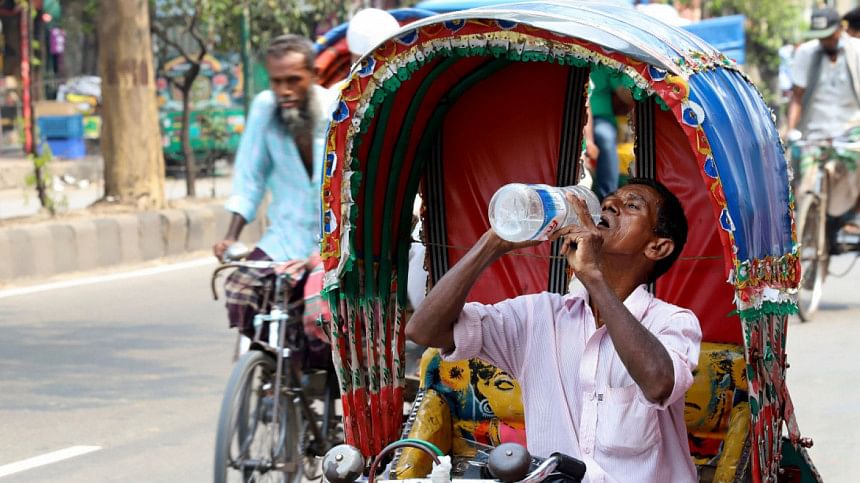Heatwave: How to avoid heat stroke

As a heatwave is sweeping across different parts of the country, physicians have advised people to avoid activity in direct sunlight to stay safe from heat stroke.
"Heatstroke can be as serious as a brain stroke if left untreated. The elderly and the children are the most vulnerable," Prof Md Khalequzzaman, associate professor at the Department of Public Health and Informatics at Bangabandhu Sheikh Mujib Medical University (BSMMU) told The Daily Star.
Heat strokes occur when the body cannot emit its temperature to the environment. This happens due to scorching heat, he said.
"Those who are fasting may suffer from dehydration as they avoid drinking during the daytime. They are usually more vulnerable to heat stroke."
He advised adding fruits like watermelon and drinking adequate water during iftar and sehri to stay sufficiently hydrated.
"But it is also important for the water or juice to be hygienic and safe to avoid getting diarrhoeal diseases," Dr Khalequzzaman said.
Chronic kidney disease patients are very much vulnerable to heatwaves. During hot and humid days fluid requirement is increased. If proper fluid replacement is not done, kidney function deteriorates. Blood pressure also fluctuates.
"Kidney patients should not fast if kidney function is moderate to severely impaired. They should not take highly concentrated fruit juice," said Dr Kazi Shahnoor Alam, a professor at the National Institute of Kidney Disease and Urology Dhaka.
The World Health Organisation (WHO) also has some general advice to follow during heat waves.
If anyone feels dizzy, weak, anxious or experiences intense thirst and headache during a heatwave, it is best to move to a cool place as soon as possible and then measure body temperature.
WHO advises drinking some water or fruit juice to rehydrate in such cases.
Rest immediately in a cool place if you have painful muscular spasms (particularly in the legs, arms or abdomen), and take oral rehydration solutions containing electrolytes.
If heat cramps last more than one hour or if someone experiences unusual symptoms or if the symptoms persist, WHO advises to consult a doctor.
To protect yourself during a heatwave, WHO has also advised moving to the coolest room in the house, especially at night. If it is not possible to keep your home cool, spend 2-3 hours of the day in a cool place (such as an air-conditioned public building).
WHO also tells us to avoid going outside during the hottest time of the day. Avoid strenuous physical activity if you can. If you must do strenuous activity, do it during the coolest part of the day, which is usually in the morning between 4:00am and 7:00am.
Stay in the shade. Do not leave children or animals in parked vehicles, WHO adds.

 For all latest news, follow The Daily Star's Google News channel.
For all latest news, follow The Daily Star's Google News channel. 





Comments